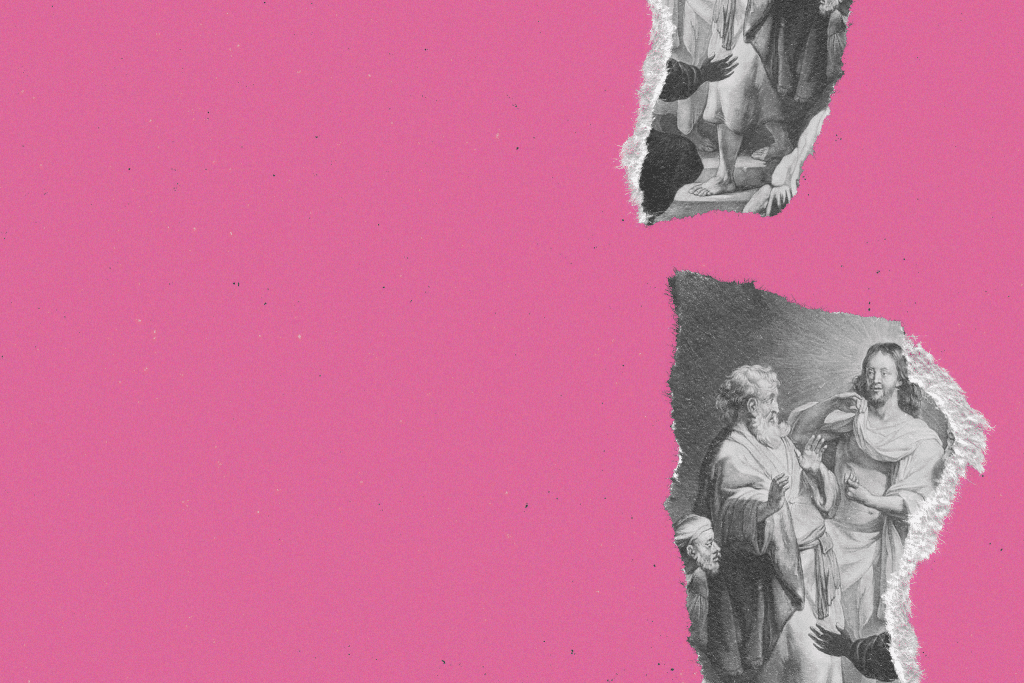John doesn’t tell us how the Apostles responded to Mary Magdalene’s news. Mark says that they didn’t believe (16:11) and Luke says they took it as “delirious babbling” (24:11), but John and Matthew let it pass without comment.
Maybe they were embarrassed. John, in particular, had known Jesus so intimately, had laid his head on Jesus’ breast and listened to the beat of the Sacred Heart as God prepared to die. He had run from the Garden, but he’d returned, standing beneath the foot of the cross, refusing to look away as he watched his Master take his last breath. He’d shown courage in the face of the soldiers who might easily have forced him to share in Jesus’ suffering. He’d offered compassion to the Blessed Mother as he received her as his mother (and ours). He’d even raced to the tomb to investigate on Easter morning when word came that it was empty. He had done more than anyone could have asked, far more than all the rest of the Apostles.
But he hadn’t believed. “They did not yet understand the Scripture that he had to rise from the dead” (Jn 20:9), he recalls, surely cringing at the memory. He had seen Jesus walk on water, raise the dead, calm the seas, and walk unscathed through a murderous crowd, but this? This prophesied resurrection that Jesus had foretold again and again? This was too much. Even the Beloved Disciple was sure it was simply too good to be true.
And then there he was, walking in their midst. He’d passed through a locked door, impossibly among them, just as he had been when he’d walked up to their boat in the center of the sea.
It should have been the most joyful moment of their lives. But maybe it wasn’t.
Mary Magdalene had flung herself on him, pure joy erupting from the anguish that had begun to swallow her. But Mary Magdalene had been the first. She hadn’t refused to believe, hadn’t ignored one witness after another.
John had. And the others, too.
And so when Jesus walked into the room, their reaction may not have been untainted delight. They may have been ashamed. They may have been afraid to meet his gaze, worried that he would shine a spotlight on their doubt and let them know how disappointed he was.
But Jesus offered them peace. Not merely as a standard greeting but as a plea, a promise of forgiveness. “Peace be with you,” he said. And when he’d said this and shown them his hands and his side, the worry and the doubt and the fear began to subside. The shock turned to wonder as they blinked their eyes and shook their heads and rewrote the story of defeat that had begun to define them. And lest they cling to that shame in the midst of their joy, he said it again: “Peace be with you.”
Then he sent them out. Not merely to proclaim the good news, as he had before and would again. But to his apostles, he gave a very particular mission: the forgiveness of sins.
“As the Father has sent me,” he said, “so I send you.” As Jesus was sent into the world for the forgiveness of sins, so were these first priests. “Whose sins you forgive are forgiven them,” Jesus said after giving them the Holy Spirit, “and whose sins you retain are retained.”
This was no grudging forgiveness of their faithlessness, no halfhearted restoration to his service. Jesus looked at the men who had slept through his agony, fled from his capture, hidden and denied and doubted, and still, he gave them his very own mission, his very own power.
Perhaps that’s why John leaves out the doubt: not because he’s still ashamed but because he was so thoroughly forgiven that he’d half forgotten he’d been so wrong. He’d mentioned already that he hadn’t known Jesus was going to rise; why belabor the point? He’d fallen and been raised up—not just raised to his feet but raised up to the heights, far more glorious than he’d been before his fall. He wasn’t just restored, he was resurrected, made new by the risen Christ.
The world must have sparkled with hope and possibility that afternoon, the birds’ songs ringing like masterpieces and the laughter of children a promise of eternal joy. Because not only had Jesus risen, he’d raised up his fallen followers, just as he’d promised. His resurrection had become theirs.
It’s become ours, too. Not just because he’s ransomed us from death and won our salvation, but because the rescue he offers isn’t restoration to what we were but resurrection to new life. When he forgave our first priests for their failure and gave them the power to absolve sins in his name, he showed us that his mercy is abundant and unstinting, not merely dragging us out of the mud but making us radiant.
His very first word to John wasn’t “Why?” or “Seriously??” or “Come on, man!” It was, “Peace.”
That’s what the resurrection offers: not a demand that we push ourselves to our feet and drag ourselves the rest of the way to Calvary, but a pierced hand reaching down to us to pull us into his embrace, eyes twinkling with joy and soft with compassion, and a gentle voice saying, “Get on up. And watch as I make all things new.
